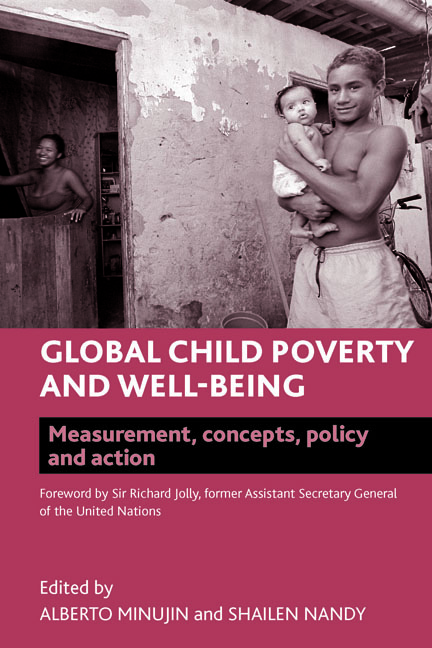twenty-three - Conclusion
Published online by Cambridge University Press: 07 September 2022
Summary
This book has presented examples of ongoing work around the world that focus on the conceptualisation and measurement of child poverty and well-being. To this end, individual chapters reported findings of country-level case studies from Bangladesh, Congo Brazzaville, Haiti, Iran, Morocco, South Africa, Tanzania, the US and Vietnam. Chapters also presented regional case studies, with material and data from the European Union (EU), Latin America, Central and Eastern Europe, Sub-Saharan Africa and South Asia. Authors of all these chapters are currently involved in, and represent most of the key international research on, the measurement of multidimensional child poverty. Each contributor discussed the implications of child-sensitive poverty measures for policy making in different settings and, by placing children, and their particular needs, at the centre of poverty analyses, we believe the approaches presented in this book will benefit ongoing and future anti-poverty policies. The United Nations’ (UN) adoption of a formal international definition of child poverty in 2006 lent considerable weight to the UN Children's Fund's (UNICEF) now decade-long call for poverty reduction programmes to begin with children (UNICEF, 2000).
As the focus of the book has been the measurement of child poverty and well-being, chapters have covered a combination of theoretical, methodological and policy-relevant material. The considerable potential of using multidimensional indicators to examine child poverty not only within countries, but also between them and also over time, should be apparent. In addition, the methods and data presented can also be used to examine disparities and inequities within and between countries. Both are critical issues in poverty research (see Chapter Three), as they result from disparities in power which perpetuate poverty (Townsend and Gordon, 2002). With survey data continually becoming available (for example, UNICEF is currently running a fourth round of Multiple Indicator Cluster Surveys in over 45 countries), poverty researchers can now detail and track outcomes for different socioeconomic groups and areas over time, to show whether or not gaps between the haves and the have-nots are closing. If, as has happened in some rich countries (Milanovic, 2005), incomes and outcomes improve faster for the rich than for the poor, then this would prove a damning indictment for the development strategies of the last few decades.
- Type
- Chapter
- Information
- Global Child Poverty and Well-BeingMeasurement, Concepts, Policy and Action, pp. 567 - 574Publisher: Bristol University PressPrint publication year: 2012



